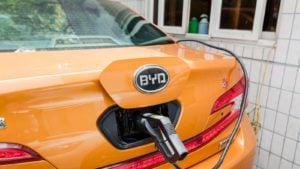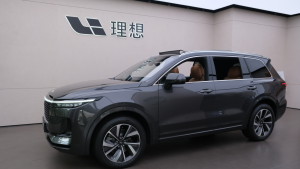According to Bank of America (NYSE:BAC) analysts, Tesla could see a sharp decline of 18% in 2026, marking a 65% decline from its 2022 data. Recent reports show EV sales are slowing, forcing other companies to cut prices and focus more on hybrid models. However, U.S. EV sales hit a record 1.2 million in 2023, with projections for more growth in 2024.
Analysts recommend considering these top EV stocks instead of Tesla right now.
BYD Auto Co. (BYDDF)

Warren Buffett showed an early interest in BYD Auto Co. (OTCMKTS:BYDDF), sending one of his executives to tour its headquarters for China’s car market. In 2008, BYDDF’s co-founder Wang Chuanfu drank battery fluid to showcase its cleanliness. Shortly thereafter, Buffett bought a 10% BYDDF stake for $252M, although he originally offered to buy 25%.
Just today, Shenzhen’s EV giant revealed that they have named their newest electric pickup as Shark. The model aims to compete with Tesla’s Cybertruck, and many are considering the Shark more than the latter. Also, this is BYDDF’s first entry into electric pickups. The price for this model has yet to be disclosed, but it will feature a plug-in hybrid system. The launch date is expected before the end of the year, with this model targeting the global market.
Additionally, BYD Auto Co. surpassed Tesla as the top EV seller in Q4 of 2023. Debuted in November, the Cybertruck is only available in the U.S. market, and it also added some hurdles for its entry in the Chinese market. On the other hand, BYDDF has yet to venture into the U.S., reducing direct competition. The Cybertruck is fully electric, while the Shark uses hybrid technology.
Li Auto (LI)

Chinese automaker Li Auto (NASDAQ:LI) specializes in intelligent electric SUVs focusing on range extension tech, appealing to consumers wary of charging. In fiscal year 2023, Li Auto delivered 376,000 vehicles, an 182.2% year-over-year (YOY) increase, maintaining lower prices and expanding margins efficiently. Analysts forecast 75% upside with a $51 target on LI stock.
Recently, the EV company slashed prices by 5% on four models, continuing the ongoing EV price war. The move follows Tesla’s and BYDDF’s price cuts. Li Auto cut prices by 18,000 to 30,000 yuan ($2,485-$4,142) and offered refunds to recent buyers. Earlier discounts were offered in January.
The Li L6 received 10,000+ orders within 72 hours of availability. The vehicles are now in Li Auto’s 480 retail centers in China. The Li L9, launched in 2022, had over 30,000 orders in the same timeframe. The company required a RMB 5,000 deposit for each Li L9 order, refundable within a specified period. The Li L6 launched on April 18 with Pro and Max trims, priced at RMB 249,800 and RMB 279,800. Orders opened with a RMB 5,000 refundable deposit.
Panasonic Holdings Corp. (PCRFY)

Panasonic Holdings Corp. (OTCMKTS:PCRFY) stands out for its battery technology and diverse electronics portfolio. Collaborations with Tesla, Mazda and Toyota enhance its market presence. Despite market challenges, PCRFY aims to quadruple capacity by 2031. It is focusing on silicon-based technology for EV advancements and solid-state batteries for robotics and drones.
The company is still somehow dependent on Tesla’s growth. In 2023, Panasonic aimed to increase more production, with plans to increase the numbers by 10% in Tesla’s Nevada factory. Also, Panasonic’s production numbers are expected to quadruple by 2031. Notably, the company is expanding its U.S. manufacturing and partners with Lucid. Investments in silicon-based and solid-state battery tech ensure this battery giant’s long-term relevance.
Moreover, Shinobi Therapeutics partnered with Panasonic Holdings Corp. and Kyoto University’s CiRA to develop an efficient, low-cost iPS-T cell therapy manufacturing platform. Panasonic aims to make these therapies more accessible. Nissan and PCRFY will soon introduce a service connecting car data to home appliances via Internet of Things (IoT). Relevant information, like the charging status of your vehicle, will be able to be seen on TV screens or through home appliances. That’s the future, and Panasonic Holdings Corp. is really leading the way in some important innovations right now.
On the date of publication, Chris MacDonald did not have (either directly or indirectly) any positions in the securities mentioned in this article. The opinions expressed in this article are those of the writer, subject to the InvestorPlace.com Publishing Guidelines.
Chris MacDonald’s love for investing led him to pursue an MBA in Finance and take on a number of management roles in corporate finance and venture capital over the past 15 years. His experience as a financial analyst in the past, coupled with his fervor for finding undervalued growth opportunities, contribute to his conservative, long-term investing perspective.
